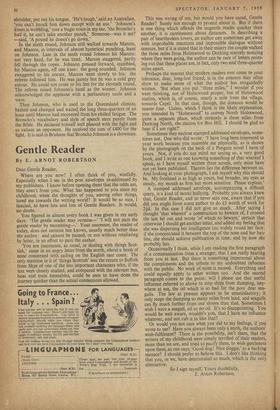Gentle Reader
By E. ARNOT ROBERTSON Dear Gentle Reader, Where are you now? I often think of you, wistfully. Especially when I see in the post envelopes re-addressed by my publishers. I know before opening them that the odds are, they aren't from you. What has happened to you since my childhood, when the thoughts of you, among other things, lured me towards the writing world? It would be so nice, I fancied, to have lots and lots of Gentle Readers. It would, no doubt.
You figured in almost every book I was given in my early days. 'The gentle reader may surmise—"I will not pain the gentle reader by recounting—.' Your successor, the reader of today, does not surmise but knows, usually much better than the author: and cannot be pained, or not without retaliating by letter, in an effort to pain the author.
'You are inaccurate, as usual, in dealing with things Scot- tish,' came in an angry letter from the north, about a book of mine concerned with sailing on the English east coast. The only mention in it of 'things Scottish' was the return to Suffolk from Skye of one of the less important characters who, if the text were closely studied, and compared with the relevant bus, boat and train timetables, could be seen to have done the journey quicker than the actual connections allowed. This was wrong of me, but would you have cared, Gentle Reader? Surely not enough to protest about it. But if there is one thing which offends the ungentle reader quicker than another, it is carelessness about distances. In describing a pair of heartbroken lovers, an author can sometimes get away with improbable reactions and impossible dialogue without censure, but if it is stated that in their misery the couple walked the three miles from Holmwood to Dorking scarcely noticing where they were going, the author can be sure of letters point- ing out that these places are, in fact, only two and three-quarter miles apart. Perhaps the nearest that modern readers ever come to your tolerance, dear, long-lost friend, is in the concern they often show to make sense of what the author has misguidedly written. 'But when you put "three miles," I wonder if you were thinking, not of Holmwood proper, but of Holmwood station, which is, of course, nearly a mile from the village, towards Capel. In that case, though, the distance would be nearer four. Unless, which I think is the likely explanation, you intended by "Holmwood" to convey North Holmwood, quite a separate place, which certainly is three miles from Dorking North, the station for Box Hill. I should be glad to hear if I am right?'
Sometimes they enclose stamped addressed envelopes, some- times not., One who did wrote: 'I have long been interested in your work because you resemble me physically, as is shown by the photograph on the back of a Penguin novel I have of yours. Not, if you do not mind me saying so, a very good book, and I write as one knowing something of that whereof I speak, as I have myself written three novels, only mine have not yet been published. Therein lies the difference between us. And looking at your photograph, I ask myself why this should be. My forehead is as high as yours, but broader, my eyes as steady, my mouth as firm but more sensitive. Please explain.'
A stamped addressed envelope, accompanying a difficult query, is a kind of moral bullying. Probably you always knew that, Gentle Reader, and so never sent one, aware that if you dill you might force some author to do £5 worth of work for 20. In this case I did not give so much. After saying I thought 'that whereof' a construction to beware of, I crossed the last bit out and wrote 'of which to beware,' certain that otherwise I should get another letter, and added my feeling that she was dispersing her intelligence too widely round her face: if she concentrated it between the top of the nose and her hair line, she should achieve publication in time; and by now she probably has. Occasionally I think, while I am reading the first paragraph of a communication from a stranger, that I am really hearing from you at last. But there is something impersonal about the compliments and the tribute to my undoubted influence with the public. No work of, mine is named. Everything said could equally apply to other writers too. And the second paragraph comes to the point: will I please use that useful influence referred to above to stop ships from dumping, any- where at sea, the oil which is so bad for the poor dear sea- gulls. The law at present appears to be unsatisfactory; it only stops the dumping so many miles from land, and seagulls can fly much further from our shores than that. Sometimes 1 wish I were a seagull, oil or no oil. It's so disappointing. You would be well aware, wouldn't you, that I have no influence whatever, and not rub it in like that?
Or would you not care what you did to my feelings, if you wrote to me? Have you always been only a myth, the authors' wish-fulfilment? There is the possibility, isn't there, that the writers of my childhood were simply terrified of their readers, more than we are, and tried to pacify them, to wish gentleness upon them, as one says, 'Good dog! Nice doggie,' to a barking menace? I should prefer to believe this. I don't like thinking that you, or we, have deteriorated so much, which is the only alternative.
So I sign myself, Yours doubtfully, E. Arnot Robertson.














































 Previous page
Previous page